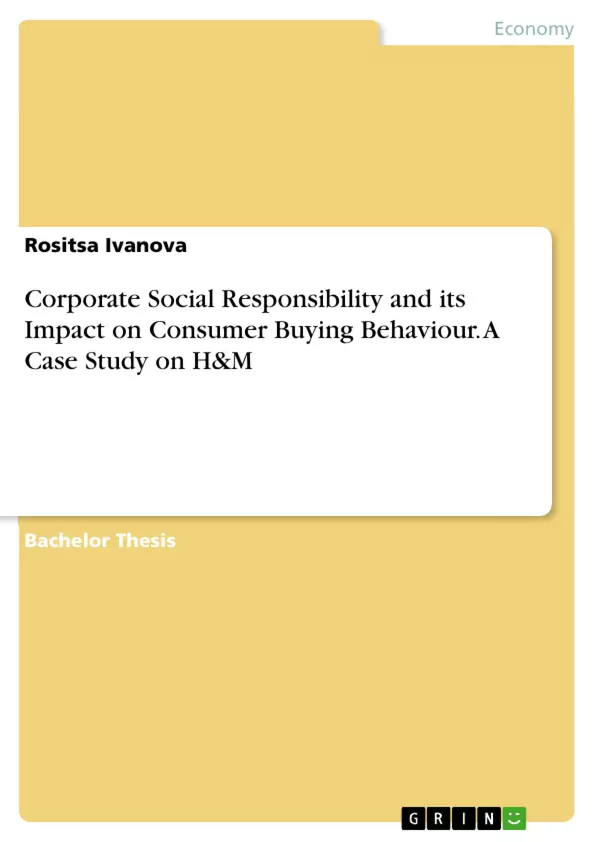The challenges of the XXI century affect every aspect of daily life and fashion industry is no exception. Being highly-intensive, clothing manufacturing becomes one of the first industries characterized as global with production and distribution lines spread out literally all over the world. While globalized activities are in general positively regarded, the down side of the clothing industry’s internationality is that its production is being oriented to take place in countries with cheap workforce, varying government regulations, non-standardized employment and nature protection norms, causing thus a number of ethical issues. To balance out the controversy of the sector, clothing companies’ management have been changing to embrace Corporate Social Responsibility (CSR) as a policy in attempt to find new solutions and respond to the rigorous demands from customers and stakeholders.
Table of Contents
- I. INTRODUCTION
- 1.1 BACKGROUND
- 1.2 TASKS OF THE STUDY AND HYPOTHESIS
- 1.3 SUBJECT, OBJECT AND RELEVANCE OF THE RESEARCH
- 1.4 METHODOLOGY
- 1.5 STRUCTURE OF THE RESEARCH
- II. CHAPTER ONE. THEORETICAL FOUNDATION AND EVOLUTION OF CORPORATE SOCIAL RESPONSIBILITY
- 2.1 DEFINITION OF CORPORATE SOCIAL RESPONSIBILITY
- 2.2 EVOLUTION OF CORPORATE SOCIAL RESPONSIBILITY FROM THE ROMAN EMPIRE TO NOWADAYS
- 2.3 RESEARCH METHODOLOGY
- III. CHAPTER TWO. CORPORATE SOCIAL RESPONSIBILITY IN THE RETAIL INDUSTRY
- 3.1 CSR IN RETAIL
- 3.2 WILLINGNESS TO PAY FOR CSR
- 3.3 INTERDEPENDENCE BETWEEN CSR AND CUSTOMER SATISFACTION
- IV. CHAPTER THREE. THE CASE STUDY OF CSR IN H&M
- 4.1 IMPLEMENTATION AND EVOLUTION OF CSR PRACTICES IN H&M
- 4.2 CURRENT CSR PRACTICES AND PROGRAMMES
- 4.3 EMPIRICAL STUDY OF THE EXISTING CSR PROGRAMMES IN H&M
- V. CONCLUSION
Objectives and Key Themes
This research aims to investigate the potential relationship between corporate social responsibility (CSR) and consumer behaviour within the fashion industry. It focuses on the conditions and situations where a company's CSR initiatives might influence positive behavioural intentions among its customers. The study examines the evolution of CSR, its implementation in the clothing sector, and the factors that motivate companies to adopt CSR practices.
- The evolution of CSR as a concept and its application in the clothing industry.
- The impact of CSR on consumer buying behavior in the fashion industry.
- The motivators for implementing CSR in the clothing sector.
- The role of Carroll's pyramid of corporate social responsibility in understanding CSR practices.
- The research methodology employed to test the impact of CSR on consumer behaviour.
Chapter Summaries
- I. INTRODUCTION This introductory chapter sets the stage for the study by providing background information on the fashion industry and the growing importance of CSR. It outlines the research objectives, tasks, and hypothesis, along with the methodology and structure of the study.
- II. CHAPTER ONE. THEORETICAL FOUNDATION AND EVOLUTION OF CORPORATE SOCIAL RESPONSIBILITY This chapter delves into the definition and evolution of CSR, tracing its roots from the Roman Empire to the modern era. It explores the concept of CSR through the lens of Carroll's pyramid model and examines the motivations and methodologies behind its implementation in various industries.
- III. CHAPTER TWO. CORPORATE SOCIAL RESPONSIBILITY IN THE RETAIL INDUSTRY This chapter focuses on the application of CSR within the retail industry, particularly examining the relationship between CSR and consumer behaviour. It explores the concept of willingness to pay for CSR, the interdependence between CSR and customer satisfaction, and the specific challenges and opportunities that CSR presents in the retail sector.
- IV. CHAPTER THREE. THE CASE STUDY OF CSR IN H&M This chapter presents a case study of H&M, a major player in the clothing industry. It examines the implementation and evolution of CSR practices at H&M, detailing current CSR programmes and initiatives. It also includes an empirical study of the effectiveness of H&M's CSR programmes in influencing consumer behaviour.
Keywords
The primary keywords and focus topics of this study include corporate social responsibility, consumer behaviour, fashion industry, clothing manufacturing, Carroll's pyramid of corporate social responsibility, ethical issues, willingness to pay, customer satisfaction, case study, H&M, empirical research, and consumer surveys.
Frequently Asked Questions about CSR and Consumer Behaviour at H&M
What is the main focus of the H&M case study?
The study investigates the relationship between Corporate Social Responsibility (CSR) initiatives and consumer buying behaviour within the fashion industry, specifically looking at H&M.
What are the ethical challenges in the modern fashion industry?
Key issues include the use of cheap workforce in developing countries, non-standardized employment regulations, and the environmental impact of highly intensive clothing manufacturing.
How has the concept of CSR evolved over time?
The research traces the evolution of CSR from the Roman Empire to modern times, highlighting how it has become a necessary policy for companies to respond to customer and stakeholder demands.
What is Carroll's pyramid of Corporate Social Responsibility?
It is a theoretical framework used in the study to categorize CSR into four levels: economic, legal, ethical, and philanthropic responsibilities.
Does CSR influence customer satisfaction?
Yes, the study explores the interdependence between CSR practices and customer satisfaction, as well as consumers' willingness to pay more for ethically produced goods.
What empirical methods were used in this research?
The research utilized qualitative and quantitative methods, including consumer surveys and a detailed case study of H&M's specific CSR programmes.
- Citation du texte
- Rositsa Ivanova (Auteur), 2019, Corporate Social Responsibility and its Impact on Consumer Buying Behaviour. A Case Study on H&M, Munich, GRIN Verlag, https://www.grin.com/document/1380446



